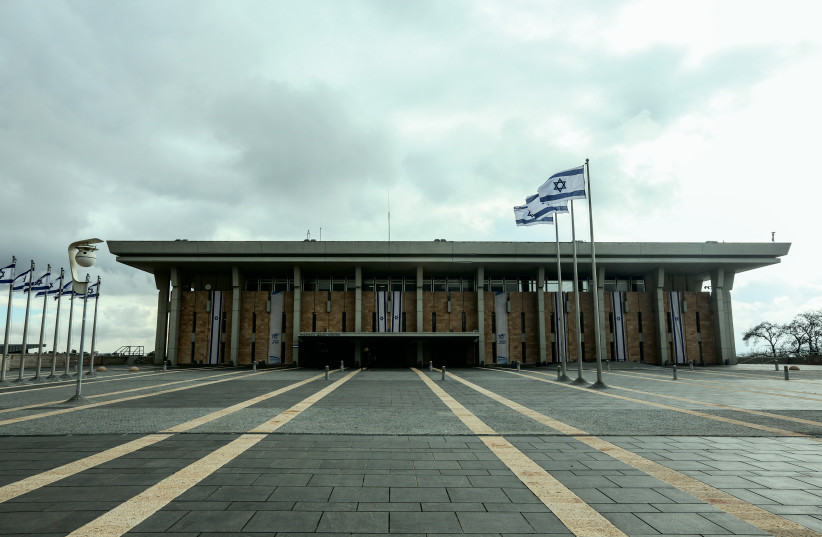A plea bargain deal is reportedly getting very close in which Shas MK Arye Deri will resign from the Knesset, admit to mild tax offenses and pay a NIS 180,000 fine but avoid prison time.
It was unclear whether there would be some additional details and whether the deal would be formally announced already on Thursday or in the near future, given that Attorney-General Avichai Mandelblit steps down on February 1.
Already on Monday night, Channel 12 reported a plea deal might be in the works, but that report did not include the fine and appeared to be leaked by Deri himself to present his resignation from the Knesset as a “voluntary” move.
In contrast, the latest version of the deal on Wednesday included a significant fine and said nothing about the Knesset resignation being voluntary.
It still does appear that Deri will be able to remain chairman of the Shas Party and at least be able to initially run for the next Knesset.

Whether he will be able to be a minister in any future government will likely be decided only if he is nominated and after an expected petition is filed to the High Court of Justice.
The likely plea deal is not expected to include a finding of moral turpitude – which automatically disqualifies politicians for seven years – but Deri will have the unique distinction of having been previously convicted for bribery, sent to jail, banned from politics for almost 10 years, returning and then being convicted again.
Though the deal is not final, anti-corruption NGOs have already threatened to file petitions to the High Court against the deal as being too lenient, saying any deal should bar Deri from politics and send him to jail.
Multiple leaks this week came after a prior leak on November 25 – seemingly by Deri’s messengers – that said he would not agree to any plea deal with any serious political consequences that would force Mandelblit to file an indictment the next day.
In February, Mandelblit held a pre-indictment hearing for Deri on three counts of tax fraud totaling potentially more than NIS 1.5 million.
On January 9, Mandelblit announced his likely intent to charge Deri, though he also dropped the most serious charges of bribery which the police had probed.
In the first of the three counts of tax fraud in the Justice Ministry January 9 statement, Deri sold real estate in Givat Shaul to his brother Shlomo Deri in order to perpetrate tax evasion.
The price of the sale, documents relating to reporting taxes on the sale, and characterizing the real estate as empty when it was a residence were all done with fraudulent purposes.
In the second count of fraud, Deri was paid for his investment activities by the company Green Oshen dating to 2011, when he was out of politics. He later directed the fund to make those payments to his brother Shlomo to avoid paying taxes.
From 2013 to 2015, Shlomo issued NIS 630,000 in fraudulent invoices for consulting activities that he had not provided, in order to cover up the tax evasion.
In the third count of tax fraud, Deri received payment dating to 2012 for marketing and consulting activities to a subsidiary of Egged and businessman Moshe Habah. Deri directed NIS 180,000 of his fees be paid to a close associate, Yehuda Azrad. He did not report those fees for tax purposes nor did he report NIS 100,000 in additional fees paid directly to his account.
The Justice Ministry statement in January emphasized that Deri had intent to defraud the tax authorities, and that this was not a simple case of a civil misunderstanding that would result in a mere fine.
If the NIS 180,000 fine stands as part of the official final plea deal, it would appear that the fees paid to Azrad were some of the charges with greater evidentiary support.
In August 2019, former state attorney Shai Nitzan recommended indicting Deri for tax crimes, fraud, money laundering and some unspecified obstruction crimes.
After a nearly three-year probe, the police had recommended indicting then-interior minister Deri in November 2018.
The delay since 2018 has been highly unusual.
But times have not been normal. In August 2019, the country was in the midst of multiple rounds of elections.
By May 2020, the entire world was engulfed by the coronavirus crisis, which drained the Justice Ministry’s ability to focus on other issues.
And yet with all of those qualifications, Mandelblit in November 2020 indicated to the Post that Deri’s case probably should have been decided sooner and hinted that it could be decided very soon – which it was in January.
He was also cognizant in November 2020 that a new round of elections might be around the corner and that it would be controversial to issue the Deri decision in the midst of a new election season.
One source of delay that may be less known by the public is that the case itself has evolved substantially since the 2018 police recommendation.
Most of the more serious bribery charges did not pan out under scrutiny, and it morphed into a less serious, though still criminal, tax fraud case.
Aspects of the tax fraud case were discovered only in the middle of 2019, and this required bringing in new experts to the case to delve into it.
